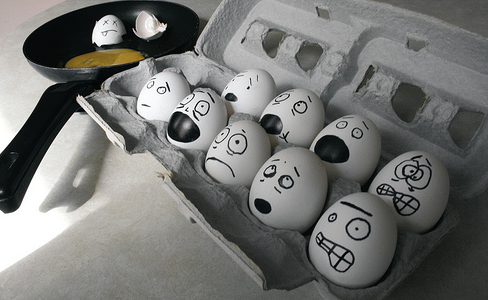Stress vs Anxiety – When Should You Be Worried?
 We tend to use the words stress and anxiety rather interchangeably in modern conversation. “I’m so stressed about this job interview” means the same to many as “I am suffering serious anxiety whenever I think about my interview”.
We tend to use the words stress and anxiety rather interchangeably in modern conversation. “I’m so stressed about this job interview” means the same to many as “I am suffering serious anxiety whenever I think about my interview”.
But in psychology, stress and anxiety are not really the same thing. And one can be quite normal, while the other can lead to serious psychological disorders.
So what is the difference? And when should you be worried?
STRESS
Stress always has a root cause or trigger. It is the result of something happening in your life you are not happy about. Perhaps you are scared you can’t afford the mortgage this month, you’re worried you’re going to be made redundant, or you are fighting too much in your relationship. Whatever it may be, stress can be linked back to an obvious incident.
The main feeling behind stress? It tends to be frustration, or perhaps tension. You might also feel overexcitable, irritated, or depressed.
 Stress is at least partly rational, in that the thing we are stressed about could have a difficult outcome. Of course stress will throw us into black and white thinking, so we are seeing the worst case scenario. A fight over parenting left unresolved can stress you to the point you are sure your partner will divorce you. While there is that possibility, it’s more likely you’ll sort it out and your marriage will be stronger.
Stress is at least partly rational, in that the thing we are stressed about could have a difficult outcome. Of course stress will throw us into black and white thinking, so we are seeing the worst case scenario. A fight over parenting left unresolved can stress you to the point you are sure your partner will divorce you. While there is that possibility, it’s more likely you’ll sort it out and your marriage will be stronger.
That is the thing about stress – even if it is really overwhelming, there is a sense there is a solution to it and that it can be dealt with if only you dared make different choices. In other words, you still have some control.
It’s a very physical experience to be stressed. This is because it triggers the body’s primal fight, flight, or freeze response. This means our heart can beat, we can break out in a sweat, our breathing can become accelerated, and we might tense our muscles. (All great when facing a wild animal in cave man times, but it can feel extreme when all we are facing is giving a presentation at work!)
High amounts of stress releases both adrenaline and the hormone cortisol, which can give us a buzzy feeling that can be quite addictive. But this ‘stress high’ can then lead to energy crashes and depression. High levels of adrenaline and cortisol can also lead to real health problems like a low immune system and heart disease.
And psychologically, stress often leads to other issues like worry, sleep problems, depression and low self-esteem.
So while stress does have a positive side in low amounts – it can help you focus, make decisions you have been putting off, and get things done – chronic or acute stress is certainly something to be concerned about.
ANXIETY
 Unlike stress, anxiety can be unexplainable and free floating. Sufferers can feel anxious but not have a real idea why. You might make guesses, and decide it must be that you are worried about an upcoming meeting – only for the meeting to pass and the horrible feeling of tension and panic to continue. You might even start to be anxious about your anxiety itself.
Unlike stress, anxiety can be unexplainable and free floating. Sufferers can feel anxious but not have a real idea why. You might make guesses, and decide it must be that you are worried about an upcoming meeting – only for the meeting to pass and the horrible feeling of tension and panic to continue. You might even start to be anxious about your anxiety itself.
The main feeling behind anxiety? Fear – even if it makes no sense to feel afraid. Fear may also manifest in its lower forms of intense worry, a feeling of doom, or a sense of unease, but it’s still fear.
Anxiety is often irrational. Phobias, for example, cause anxiety. A horror movie watched as a kid can leave an adult anxious every night about something under the bed, even though they know it’s not possible.
Because anxiety is so irrational, it can feel like you have no control, and this can leave you feeling really helpless.
Anxiety also has a very physical affect on the body. Like stress, it can see you break out in a sweat, breathe quickly, have a faster heart beat and experience muscle tension. But anxiety can be even more physically draining when it is out of control and at the level of an impending panic attack. It can cause a headache, tightening in your chest, or leave you feeling very hot or very cold.
As well as panic attacks anxiety can lead to other psychological challenges like social withdrawal, panic attacks, and paranoia.
 Because anxiety is so fear based, it has a real affect on the brain. Studies have shown that high anxiety can affect brain structures like the amygdala, which might be part of why anxiety is part of so many psychological disorders. These include Generalised anxiety disorder (GAD), Obsessive-compulsive disorder (OCD), Post traumatic stress disorder (PTSD), and phobias.
Because anxiety is so fear based, it has a real affect on the brain. Studies have shown that high anxiety can affect brain structures like the amygdala, which might be part of why anxiety is part of so many psychological disorders. These include Generalised anxiety disorder (GAD), Obsessive-compulsive disorder (OCD), Post traumatic stress disorder (PTSD), and phobias.
STRESS VS ANXIETY
stress has a specific trigger and reason vs anxiety has no identifiable root
stress can leave you feeling nervous vs anxiety can leave you feeling helpless and afraid
stress typically goes away with lifestyle changes vs anxiety persists for six months or more
stress in not a mental disorder vs anxiety can be part of various mental health disorders
stress can sometimes be dealt with by relaxation and stress management vs anxiety almost always needs therapeutic intervention to improve
stress is over something happening right now vs anxiety is over things from the past and in an imagined future
CAN STRESS AND ANXIETY OVERLAP?
Yes, of course they can and do. If someone has an anxiety disorder, it causes a lot of stress. And great amounts of stress often lead to a irrational fear of what lies ahead in life, i.e., anxiety. In fact chronic stress is found in many cases of anxiety disorders.
WHEN SHOULD YOU SEEK HELP?
 Anxiety in particular can become overwhelming because you might not know what is the cause of it which can leave you feeling at a loss or withdrawing from life. But really, both stress and anxiety can lead to serious problems if they aren’t dealt with.
Anxiety in particular can become overwhelming because you might not know what is the cause of it which can leave you feeling at a loss or withdrawing from life. But really, both stress and anxiety can lead to serious problems if they aren’t dealt with.
Counselling is helpful for any level of stress and anxiety, and it can be a good idea to start counselling the minute you are aware you have made a life choice that will cause you stress. Why? A therapist can help you navigate stress better, acting as a sounding board and helping you find tools and tactics to see you through.
The popular idea that you wait to go to therapy until things are a disaster is not actually a good one. It’s a far better idea to see counselling as something to choose in advance as a way to troubleshoot your choices, avoid disaster, and approach life with support and a useful toolbox of skills.
You should definitely see your GP or a private mental health professional if stress and/or anxiety is leading to the following:
- you are unable to function at work and/or home
- you feel overwhelmed with fear
- you are experiencing panic attacks or physical signs of anxiety like recurrent dizziness, unexplained medical symptoms, a constantly racing heartbeat, or insomnia that has gone on for weeks
Have you suffered extreme stress and anxiety? Has counselling helped? Share your story below, we love hearing from you!
Photos by Bernard Goldbach, Eric, Torbakhopper He Dead, slεεpµ╬dεmoñ™, Casey Muir-Taylor





Thanks a lot for sharing your views and your expert advice, I really hope that this will guide me to face my stress at work.
Good luck!